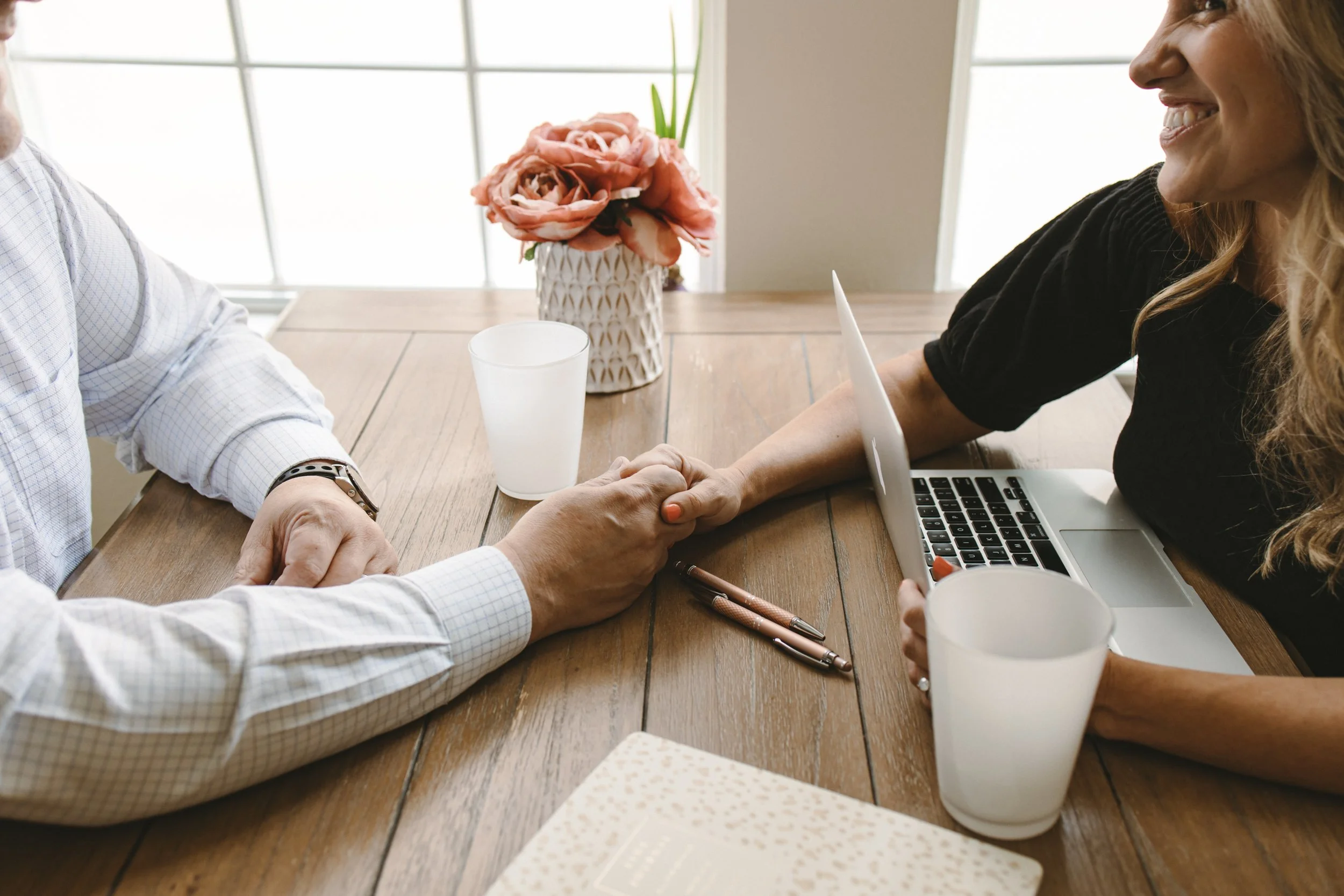Explicit
A blog for the Self-Connected woman.
Whether you’re struggling with an avoidant partner, longing to feel valued, or healing from a breakup, this blog goes beyond surface-level advice and gives you the tools to build the kind of connection you’ve always craved.
I’m Colette Jane Fehr
I’m a licensed psychotherapist, author and TEDx speaker. I’ve spent years helping people find lasting joy and connection, within themselves and their relationships.

Five Phrases You Should Never Say in Your Relationship—and Why They Destroy Emotional Safety
Some phrases land like a punch to the gut. We say them in moments of overwhelm, when our nervous system is flooded, or when we’re so frustrated that the words tumble out before we can catch them. They’re human and common, but they’re also corrosive. They chip away at emotional safety, and when emotional safety starts to erode, connection gets thinner and harder to rebuild. Here are five phrases that do real damage to the bond you’re trying to protect, and why they matter so much…

Timing Matters More Than Words in an Argument
Why timing matters more than words in an argument and how pausing, regulating, and returning to repair can transform conflict into connection.

How To Stay Connected When You Feel Dismissed
Why “it could be worse” invalidates your partner’s feelings and how to respond with empathy, presence, and real emotional connection.

When Your Partner Can’t Handle Your Emotions: Here’s What To Do
Emotional connection is the heartbeat of a healthy relationship. It’s what makes us feel seen, soothed, and safe. But what happens when your partner struggles to sit with their own emotions and can’t sit with yours? One of the most important functions of a relationship is seeking and receiving comfort; having someone who can hold space for your pain without trying to fix it or run away from it…

Stop Taking Each Other for Granted: The Power of Appreciation in Long-Term Love
It’s so easy to slip into autopilot in a long-term relationship. You get used to your partner being there — the one who unloads the dishwasher, takes the dog out, picks up the kids, pays the bills, or makes your coffee just the way you like it. And because they do it so often, you stop noticing.
But here’s the truth: every relationship needs appreciation like a plant needs sunlight. Without it, even the best partnerships start to wilt.

Why Your Partner Isn’t Hearing You (Even When You Think You’re Clear)
One of the most frustrating parts of a relationship is when you feel like you’ve said the thing—but your partner still doesn’t get it. The truth is, a lot of what we call “communication” is really blame, assumption, or mind-reading dressed up as honesty. It feels like we’re being clear, but in reality we’re putting up walls instead of building bridges.

You Can’t Make Your Partner Change But You Can Do This
One of the hardest truths in relationships is this: you can’t make your partner change. That doesn’t stop us from trying. We plead, hint, nag, withdraw, explode, or silently hope that if we just love them enough, sacrifice enough, or wait long enough, they’ll suddenly become the partner we need. But change doesn’t work that way. Change is an inside job. It happens only when someone chooses it.

Six Core Attachment Needs in Every Relationship
One of the most powerful truths I’ve learned as a couples therapist is this: no matter how different we seem, we all share the same fundamental needs when it comes to love and connection. These aren’t luxuries or “nice-to-haves.” They’re wired into us. They’re attachment needs — the foundation of safe, secure, lasting relationships.

How to Fight Better in Your Relationship
Most couples assume the goal is to fight less. The real goal is to fight better. Conflict is going to happen—it’s part of being close to someone. What matters is how you handle it. Here are three shifts that can change the way you argue…

The Power of Touch: Why Physical Affection Matters More Than You Think
Studies show that regular affectionate touch can reduce blood pressure, improve immunity, and even lengthen lifespan. The Gottman Institute—world-renowned for its relationship research—recommends long hugs and lingering kisses because they help couples stay emotionally and physiologically attuned to each other.
Even the smallest things—sitting close together, holding hands, resting your head on their shoulder—are like sweet harmonies that create a symphony of calm in your nervous system.

Why Relationships Are the Key to a Long Life
Discover why research says strong relationships are the key to a happy life. Learn how inner circles and community connections boost well-being and how to start building them today.

Forecast Your Feelings, Save Your Relationship
Couples often wait until their relationship reaches a breaking point before addressing the issues that are causing deterioration. A much more effective approach is to proactively build habits and improve communication skills that foster connection, even before difficulties arise.

How to Stay Connected When Life Transitions Change Everything.
Life is a series of transitions. Some are expected, like children graduating and leaving home. Others arrive without warning, like the loss of a job, the end of a relationship, or a health diagnosis. Whether you see them coming or not, these shifts have one thing in common: they change your relationships…

How to Handle Toxic Workplace Relationships Without Losing Your Sanity
Work isn’t just where you earn a paycheck. It’s where you spend most of your waking hours. So when the environment becomes emotionally toxic, it’s more than just annoying—it’s draining, stressful, and sometimes even damaging to your confidence and wellbeing. Here’s how to handle some of the most common toxic workplace dynamics with clarity and strength.

The Weekly Check-In: The Simple Ritual That Can Transform Your Relationship
If there’s one habit I wish every couple would adopt, it’s the weekly check-in meeting. It doesn’t sound sexy. But what is sexy is feeling seen, feeling appreciated, and not letting resentment quietly build up until someone blows. Most couples don’t fall apart because of one big betrayal. They drift. They disconnect. They stop tuning in. The weekly check-in is a simple, powerful way to stay emotionally connected—to catch issues early and keep your relationship on solid ground.

When Emotional Reactivity Becomes Emotional Abuse
If you’re with someone who explodes, stonewalls, pouts, or punishes you just for sharing your emotional truth, that’s not just emotional reactivity. That’s emotional abuse.
Here’s how the pattern usually goes:
You bring something up calmly. Maybe you’re even scared to say it because you’ve been here before. You’ve rehearsed the words in your head, softened your tone, tried to be fair. But no matter how gently you speak, your partner flips into reactivity and suddenly you’re the bad guy.

The Coldplay Kiss-Cam Scandal and the Truth About Infidelity
When Coldplay’s kiss-cam landed on tech CEO Andy Byron and his colleague—who wasn’t his wife—it set off a media firestorm. Within days, he resigned and the internet had a field day. But beneath the viral moment is a much bigger issue we don’t talk about nearly enough:
Infidelity at work is far more common than people think.

Why Your Partner Stops Listening & How to Change It
We’ve all been there. You’re upset and before you know it, you’re no longer just talking about the thing that hurt you. You’re bringing up last week, last month, last year and everything under the sun that’s ever bothered you about your partner. It’s a communication pattern therapists call kitchen sinking and it’s one of the fastest ways to shut down real connection in a relationship.

8 Habits of Healthy Couples: What They Do Differently
Relationships don’t thrive by accident. They thrive because both partners consistently practice habits that strengthen their bond, even when life gets messy. Here’s what healthy couples do often—and why it matters:

The Truth About Breakups (Even If It’s Not What You Want to Hear…)
Whether you saw it coming or got blindsided, losing someone you loved (or even just thought you loved) can feel like your whole world is crumbling. It’s messy, painful, and can make you question everything—yourself, your choices, even the meaning of love.
Start your journey
I can help you understand the attachment dynamics in your relationship, identify where you’re getting stuck, and improve the way you communicate. Let’s do this!

